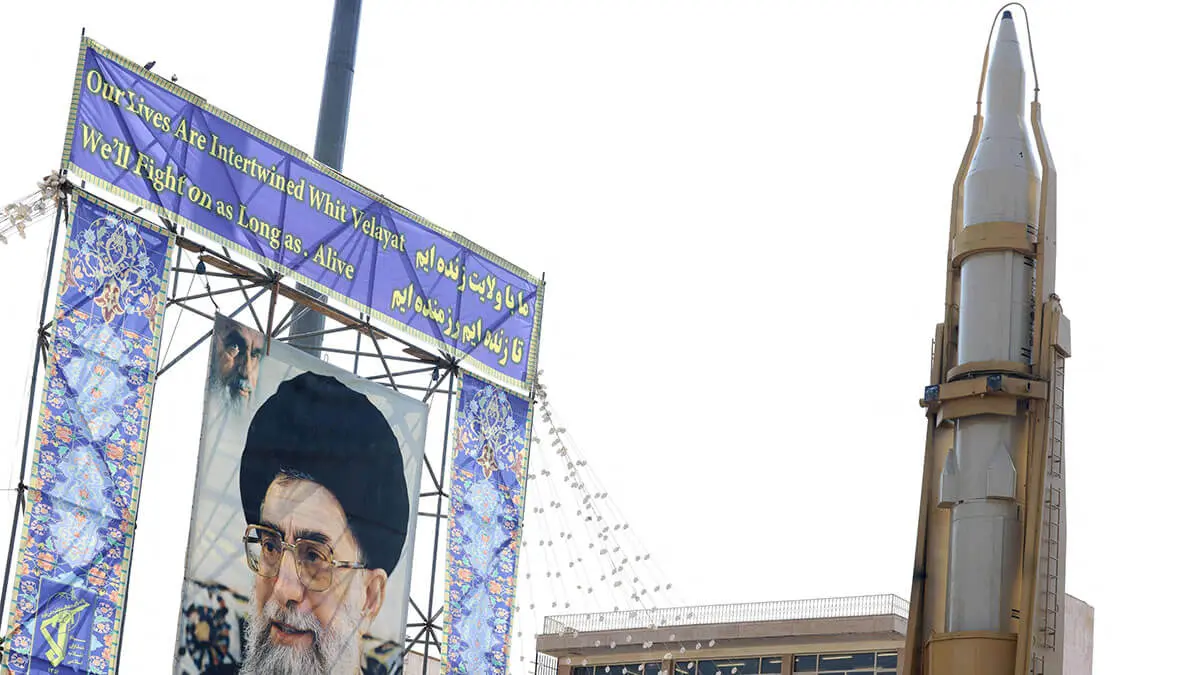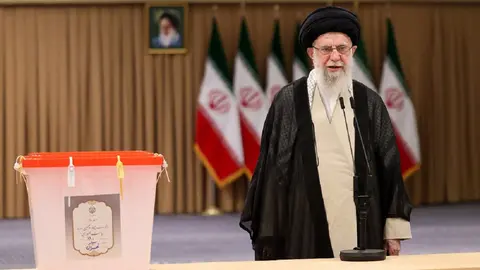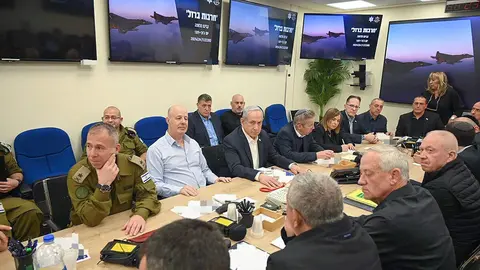Iran’s hubris is prescription for failure

Numbers are the Iranian response to its failure to achieve real hits and effective penetration of enemy airspace.
There is no underestimating Iran’s military capabilities, especially those of the Revolutionary Guard Corps (IRGC).
The Guards have at their disposal the capabilities of an entire nation and can use them as they so desire. In addition to their military power, the Guards have the ear of the Supreme Leader, Ayatollah Ali Khamenei, who can transform any idea into a political decision that would be binding for the whole Iranian state.
We can level a lot of criticism at Iran based on our political views towards the regime in Tehran, but no one can say that Iran is not a nation with a deep-rooted history.
As an ancient nation, Iran can provide its projects with the human potential derived from its accumulated knowledge, in addition to the billions of dollars which accrue from oil revenues. These facts are what made Iran continue its war with Iraq in the 1980s for a long time. These same facts are also fuelling Iran’s current stubborn attitude which is driving it to continue challenging the West and Israel.
But these are dangerous facts that have run against Iran’s interests as it tried to reach unachievable goals. Everything indicates that Tehran’s failure in the Iraq-Iran war is likely to be repeated.
Two days ago, Kamal Kharrazi, advisor to the supreme leader, said that Iran is in the process of expanding the range of its ballistic missiles. Initial estimates for Operations True Promise 1 and True Promise 2 showed that Iran fired more than 300 ballistic missiles at Israel. In April, ballistic missiles accounted for more than half of what was fired at Israel, while drones and cruise missiles accounted for the rest. The attack failed abysmally as Iran was unable to score a single hit. When it tried again in Operation True Promise 2, early last month, it realised that drones and cruise missiles had no chance of even distracting Israel’s air defences so as to allow ballistic missiles to reach their targets. Therefore, Iran focused on using advanced missile models, some of which are hypersonic missiles posing a speed and manoeuvring challenge to Israeli defence systems. About a third of the missiles was able to reach their targets making for impressive optics.
Israeli media leaks indicated that Israel chose not to intercept some of the incoming missiles because their trajectories showed that they were aimed at warplane underground hangars in the Negev, and that the cost of repairing the concrete shelters was very small compared to the cost of intercepting them with advanced missiles that cost millions.
Iranian hypersonic missile systems do nonetheless make it difficult to predict with accuracy whether Israeli or Western defence systems can completely prevent missiles from penetrating Israeli airspace and reaching their targets. In practical terms, there is a trade-off to be made between the extent of damage that can be inflicted by the missiles and the potential harm that can be triggered by the subsequent response. This was clear in Israel’s calibrated response when its aircraft attacked Iranian targets in more than one province, including Tehran itself. What Kharrazi wanted to say is that Iran will manufacture more missiles and with longer range. Numbers are the Iranian response to its failure to achieve real hits and effective penetration of enemy airspace in order to be able at a minimum to claim that it has avenged Israel’s killing of Hezbollah Secretary-General Hassan Nasrallah, his ordained successor Hashem Safieddine and Hamas Political Bureau Chief Ismail Haniyeh, along with virtually all the elite leaders in Hezbollah and Hamas. Yahya Sinwar must be wondering if anyone is going to avenge him.
Iran’s approach today is reminiscent of the atmosphere which prevailed during the Iran-Iraq war. It reveals that the Iranian Revolutionary Guards have not learned much from their experience over the decades, including that during and after the war with Iraq, up until the Operation True Promise which it carried out this year.
Despite the failure of their response against Israel, the Revolutionary Guards believe that more can achieve what little has failed to achieve. The Iranian Revolutionary Guards as a military institution has not learned from its past experience. It should have learned in particular that more is not necessarily better, and that innovation and reconsideration of military combat tactics are usually the way to go.
Against the wishes of the Iranian military commanders who had been trained in Western military schools, the IRGC chose in 1986 to continue the pattern of launching more attacks and relying on additional forces against Iraqi army defences which were protecting the city of Basra. The Iraqi army had just begun to recover from the catastrophic occupation of the city of Al-Faw, south of Basra, and had prepared more efficient plans to repel Iranian attacks on the most important sector of military operations, east of Basra. The Christmas 1986 attack on Umm al-Rasas Island began with a large force of Revolutionary Guards, volunteers and some Iranian army troops, under the name Karbala-4.
The Iraqis responded shortly after, retaking the island and killing and wounding more than a quarter of the attacking forces. The Guards insisted on attacking again two weeks later as Operation Karbala-5 targeted a narrow strip in the eastern Basra sector. Instead of realising the danger of engaging 150-200 thousand fighters from the Guards, Basij and the army into a narrow strip at Fish Lake, Kushk al-Basri, Jasim River and Shalamcheh, the Guards chose to attack with more and more forces on a front not exceeding ten kilometres. Against Iranian assailants, the Iraqis directed the muzzles of 3000 field guns, tube launchers and heavy mortars, in addition to combat aircraft from fighter jets and helicopters.
Considering the magnitude of Iranian losses, the Iraqis found no better name for the battle that extended from early January 1987 to late February than “the Great Harvest.”
Forty thousand Iranians were killed and more than 80,000 were wounded, a total loss exceeding half of the attacking forces. Senior commanders in the Pasdaran (Guards) were killed, the most important of whom was the commander of the attacking division, Hossein Kharrazi. The “Great Harvest” of 1987 was the beginning of the end of the Iran-Iraq War.
The fatal flaw of the Iranian offensive was the tactic of mobilising more and more forces in the war, without the slightest consideration for the risk of overcrowding the battlefield and exposing Iranian forces to the danger of heavy losses.
The Iranian army, which also suffered a high toll in Karbala-5, realised that the war was over and it was just a matter of time.
The Iranians found a more pragmatic and competent commander than Khomeini’s then-representative in the Supreme Defence Council, President Hojjat al-Islam Ali Khamenei. The-then Iranian Parliament Speaker Ali Akbar Hashemi Rafsanjani became the Supreme Commander of the Iranian Armed Forces, and the war with Iraq ended under his watch.
Khamenei, the first to lead the Iranian Revolutionary Guard Corps since its inception in 1979. But he himself and his fellow commanders in the IRGC still think the same way as they bet on numbers. They believe that the failure in attacking Israel can be overcome by launching more missiles, regardless of the results.
Just as the overcrowding of the battlefield with troops during all the episodes of the Iran-Iraq war led to major setbacks for the Iranian forces, the most dangerous and painful of which was Operation Karbala-5 or “The Greatest Harvest,” Kharrazi’s statements two days ago do not indicate that much has changed since 1987. The human waves have been replaced by missile waves, but the result is the same. An un-innovative military mindset kills wars. The most dangerous aspect of such a mindset is arrogance and the stubborn insistence that numbers can be the solution. One has presumed that Iran must have learned from its bitter experience of the eighties. It seems however that this is not case, and that Tehran is about to repeat its same mistakes all over again.
Haitham El Zobaidi is the Executive Editor of Al Arab Publishing House.



